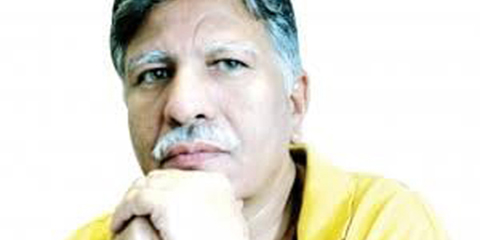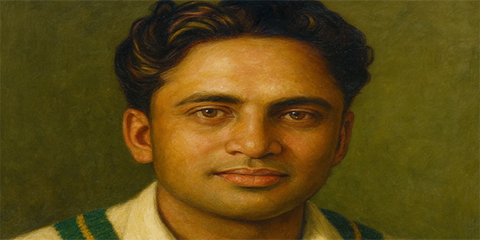Agha Akbar: Pakistan's legendary sports journalist who transformed cricket writing into literature
JournalismPakistan.com | Published 4 months ago | Dr. Nauman Niaz (TI)
Join our WhatsApp channel
ISLAMABAD — Some men write not commonly, but with the sediment of time, as though each sentence they summon must first pass through the sieve of memory, through the ache of loss, through the long corridors of silence where history itself sits in judgment. The late Agha Akbar was of that rare breed. To call him just a sports journalist is to diminish the slow majesty of his craft; he was a custodian of rituals, a raconteur of days when cricket had not yet sold its soul to commerce, when it still breathed as inheritance, a hymn of longing, a testament of belonging.
A Voice Apart in the Press Box
In the press boxes, where the air was dense with smoke and hurried arguments, where egos jostled against the tyranny of the deadline, he sat apart. His words came unhurried, like prayer. Where others reached greedily for adjectives, he sought essence. Where others filed reports, he composed elegies. The game, for him, was scripture, and each over with its sudden collapses, its stubborn resistances, deserved reverence. There are names in journalism that stand like signposts, guiding not only those who read but those who dare to write after them. Agha Akbar was such a name. He was not only acknowledged as one of Pakistan's foremost sports journalists; he was, in truth, a heavyweight in a profession where words are the only armour. To read him was to realise that the craft could carry grace, that reports on a game could rise beyond the scoreline and inhabit the territory of permanence.
From The Nation to Pakistan Cricket Board: A Career of Distinction
For years, his byline commanded The Nation, where he served as Sports Editor with an authority that came not from bluster but from the unshakable weight of craft. Later, his pen found its way into Pakistan Today, where he would assume the mantle of Business Editor. In those pages, he retained the same precision of style: a scalpel that cut through pretence and left clarity behind. His influence did not remain confined to the press box; it extended into the labyrinths of cricket administration. Within the Pakistan Cricket Board, he became a rare bridge between players, officials, and the public, eventually holding the roles of General Manager and Director of Media. He was the voice that explained, soothed, or defended cricket's sprawling empire when it needed translation.
Beyond Cricket: The Human Stories Behind Sport
But titles and positions are only the scaffolding of a career. What endured was Agha Akbar's profound understanding of sport, not only cricket, but hockey too, that once-proud game which held the nation's pulse. He possessed the rare ability to peel away layers of play and reveal the human stories beneath: of courage, of frailty, of a nation's anxieties distilled into a single contest. His prose carried an integrity that made peers respect him and readers trust him.
The Literary Approach to Sports Writing
In a country where commentary so often dissolves into clamour, Agha Akbar's prose rang like a clarion — clear, reverent, uncompromising. He belonged to a generation that understood journalism was not about the noise of the moment but the permanence of memory. For him, the scoreline was only the faintest brushstroke; what endured was the undertone — the lonely walk of a batsman carrying both faith and foreboding, the silence in a dressing-room after defeat, the rebellions hidden in posture and glance. He wrote cricket not as sport but as theatre: a stage where frailty courted faith, where gestures betrayed the human condition. He belonged to that vanishing tribe who believed writing was not to record but to remember, not to report but to revere. Ringside View, his column in The Nation, embodied this creed.
A Mentor to a Generation of Writers
In his presence, there was always depth, never grandeur. He carried the dignity of one acquainted with sorrow, yet still devoted to beauty, much like cricket itself. To younger journalists intoxicated by access and television's neon, he was a reminder that the game was not theirs to consume, but theirs to honour. His voice, measured and deep, commanded attention, yet in print it trembled with fragility, making readers believe that sport was never diversion but metaphor, never pastime but parable.
A Literary Legacy That Transcends Sport
His absence does not feel like a departure; it feels like a lantern extinguished in a corner of Pakistan's cricketing prose. What remain are fragments — brittle clippings, fading columns, words blurred by time but still singing with resonance. They endure because they were not written for the haste of the day but for the slow eternity of the soul. Now he belongs to that spectral hall of writers who treated sport as philosophy. Among them he sits, alongside those who knew that behind every six was a boyhood dream of immortality, and behind every dropped catch the unbearable weight of human failing. His legacy does not rest in archives or yellowing paper but in the belief he gave us: that sports journalism, written with conscience and craft, is literature itself, fragile, lyrical, eternal.
From WAPDA Obscurity to Literary Greatness
Some lives move in straight lines, measured, predictable, modest in their ascent. And then there are lives like Agha Akbar's: jagged, improbable, marked by an audacity to leap beyond circumstance. He began in the shadows, in a lowly post at WAPDA, tethered to routine and bureaucracy, where ambition is often suffocated under files and signatures. For many, such a beginning would be a sentence, the slow erosion of yearning into acceptance. But Agha was not of that mould. He carried within him a restlessness, a hunger that refused to be contained by clerical hours and fluorescent lights.
The Transformation: From Bureaucrat to Literary Giant
What still bewilders is the transformation, how a man who started from so little came to master so much. In journalism, he found not just a profession but a liberation. His prose carried the polish of old Oxford, though he had never walked those cloisters. Each sentence he wrote seemed to enclose a world of its own: dense, precise, yet expansive enough to breathe. There was about his style an Oxonian dignity, a cadence that made you pause, re-read, and marvel at how ordinary sport could be rendered extraordinary in his hands.
The shift from WAPDA's obscurity to the nation's press boxes is not just a story of career change. It is emblematic of what Agha represented, that writing, when done with conviction and discipline, can elevate the humblest of beginnings into the highest of crafts. He was proof that sports journalism, so often dismissed as peripheral, could aspire to literature, to philosophy.
An Improbable Journey of Excellence
Agha's life, then, was not just exciting. It was improbable, defiant, almost allegorical. He stood as a reminder that talent, when joined with grit, can leapfrog circumstance. And in his sentences — those miniature worlds of expression — he carried not just his journey, but the journeys of countless others who dared to dream beyond their station. For those who value cricket writing as a craft, Agha Akbar's name will remain among the select few who carried it forward with distinction. His prose, like the best cricket, was never merely for the moment: it aspired, quietly and effectively, to permanence.
Personal Encounters: The Man Behind the Words
I was a fledgling voice then, scribbling for The Nation as a freelance correspondent, my cricket write-ups finding their way into the paper's inner columns. It was there that I first encountered Agha Akbar, ensconced on the editorial board. He was many things at once — abrasive, arrogant, eccentric — but then so, too, were most of the great doers of our time. Through Imran Naeem Ahmad, a common friend, I found not only a break into sports journalism but a guiding hand; Agha, despite the thorny exterior, unlike Imran, didn't mentor me, not even teaching me how to write, not shaping me with that peculiar blend of severity and support that marked his character. He facilitated, since I had already made my mark, the evolution had been complete. I was freelancing, so I picked The Nation to have my columns printed there, too.
A Professional Confrontation and Mutual Respect
He was not a man to coddle. He could be unsparing, even coercive, in his demands. I recall once being on the sharp end of his pen: an article in which he took me apart while I was serving as Manager Media at the Pakistan Cricket Board. He spared nothing, left no refuge. Stung but unflinching, I picked up the phone, dialled, and without embellishment told him he had strayed beyond the line that separates professionalism from sheer obnoxiousness. On the other end, silence — not hesitation, but a momentary pause. Then, without stammering, he said he would come see me in my office.
And so he did. He came, not to offer an apology but an explanation. The unintimidated type was discomfited. With candour, he revealed the reasons — the deeper compulsions — that had forced his hand in writing that piece. I was not pacified, no, but touched. I stood, extended my hand, and told him that my respect for him had only deepened. That was Agha Akbar: unvarnished, bold, a man who looked you squarely in the eye, and in doing so, compelled you to confront not only his truth but your own. He was too much into alcohol, which eventually hurt his liver and cost him his life. I recall having met him while he was the Pakistan team's Media Manager, and there was regret. He had been dry and fighting liver cirrhosis. I felt hurt. A strong man was caving in, with death hunting him fast.
The Final Chapter: A Legend's Departure
He left us not in the noise of stadiums or the clamour of deadlines, but in the frailty of a failing body. Agha Akbar, among the last of Pakistan's true sports-writing heavyweights, succumbed to liver complications after a transplant that promised reprieve but brought only a fleeting extension of time. At his height, Akbar was not just respected; he was revered. He wrote with the solemnness of one who understood that cricket and hockey were not games but identities, rituals stitched into the nation's soul. He travelled far — from the Olympic Games to Asian arenas, from World Cups to forgotten contests — yet wherever he went, he carried with him the same unsparing gaze and lyrical prose that turned matches into metaphors, athletes into archetypes. For the void he left was not just personal, nor institutional. It was the silence of a press box missing a voice that knew how to lace fact with feeling, critique with compassion.
A Legacy for the Ages
Agha Akbar belongs now to that rare group of men who wrote not for headlines but for history. His death was not just the extinguishing of a career but the dimming of a tradition, of sportswriting as literature, as philosophy, as witness. And so we grieve, not only for the man, but for the vanishing world he embodied.

























